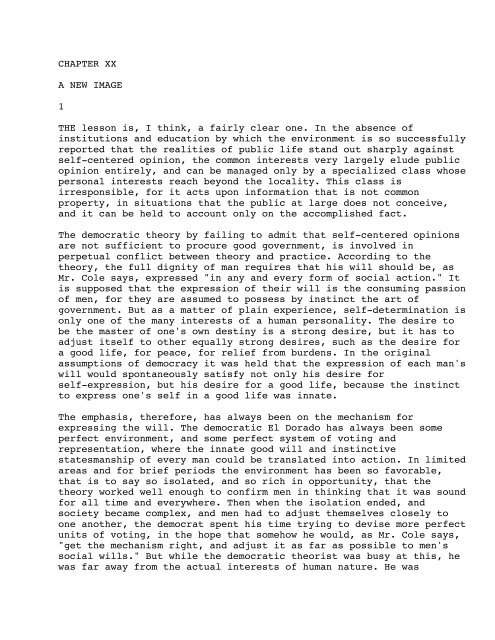PUBLIC OPINION by WALTER LIPPMANN TO FAYE LIPPMANN ...
PUBLIC OPINION by WALTER LIPPMANN TO FAYE LIPPMANN ...
PUBLIC OPINION by WALTER LIPPMANN TO FAYE LIPPMANN ...
You also want an ePaper? Increase the reach of your titles
YUMPU automatically turns print PDFs into web optimized ePapers that Google loves.
CHAPTER XX<br />
A NEW IMAGE<br />
1<br />
THE lesson is, I think, a fairly clear one. In the absence of<br />
institutions and education <strong>by</strong> which the environment is so successfully<br />
reported that the realities of public life stand out sharply against<br />
self-centered opinion, the common interests very largely elude public<br />
opinion entirely, and can be managed only <strong>by</strong> a specialized class whose<br />
personal interests reach beyond the locality. This class is<br />
irresponsible, for it acts upon information that is not common<br />
property, in situations that the public at large does not conceive,<br />
and it can be held to account only on the accomplished fact.<br />
The democratic theory <strong>by</strong> failing to admit that self-centered opinions<br />
are not sufficient to procure good government, is involved in<br />
perpetual conflict between theory and practice. According to the<br />
theory, the full dignity of man requires that his will should be, as<br />
Mr. Cole says, expressed "in any and every form of social action." It<br />
is supposed that the expression of their will is the consuming passion<br />
of men, for they are assumed to possess <strong>by</strong> instinct the art of<br />
government. But as a matter of plain experience, self-determination is<br />
only one of the many interests of a human personality. The desire to<br />
be the master of one's own destiny is a strong desire, but it has to<br />
adjust itself to other equally strong desires, such as the desire for<br />
a good life, for peace, for relief from burdens. In the original<br />
assumptions of democracy it was held that the expression of each man's<br />
will would spontaneously satisfy not only his desire for<br />
self-expression, but his desire for a good life, because the instinct<br />
to express one's self in a good life was innate.<br />
The emphasis, therefore, has always been on the mechanism for<br />
expressing the will. The democratic El Dorado has always been some<br />
perfect environment, and some perfect system of voting and<br />
representation, where the innate good will and instinctive<br />
statesmanship of every man could be translated into action. In limited<br />
areas and for brief periods the environment has been so favorable,<br />
that is to say so isolated, and so rich in opportunity, that the<br />
theory worked well enough to confirm men in thinking that it was sound<br />
for all time and everywhere. Then when the isolation ended, and<br />
society became complex, and men had to adjust themselves closely to<br />
one another, the democrat spent his time trying to devise more perfect<br />
units of voting, in the hope that somehow he would, as Mr. Cole says,<br />
"get the mechanism right, and adjust it as far as possible to men's<br />
social wills." But while the democratic theorist was busy at this, he<br />
was far away from the actual interests of human nature. He was





